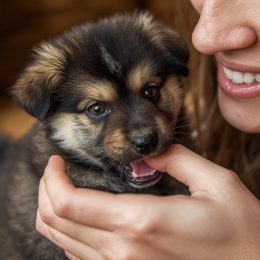
- Home
- Dangers for Puppies and Dogs
- Why Does My Dog Chew Rocks? The Dangers and How to Stop It
Why Does My Dog Chew Rocks? The Dangers and How to Stop It

Some dogs develop an unusual habit of chewing or even swallowing rocks. While it may seem harmless or just a quirky behaviour, rock chewing can be dangerous and lead to serious health issues. If your dog is chewing or eating rocks, it is important to understand why they are doing it and how to safely stop this behaviour.
Why Is Chewing Rocks Dangerous?
Chewing or swallowing rocks can pose serious health risks to dogs, including:
- Broken Teeth and Mouth Injuries – Rocks are hard and can easily crack a dog’s teeth, leading to pain, infections, and expensive dental procedures. Sharp edges can also cause cuts inside the mouth.
- Choking and Intestinal Blockages – Swallowing a rock, even a small one, can lead to choking or a life-threatening obstruction in the digestive system, often requiring emergency surgery.
- Internal Injuries – Even if a dog manages to swallow and pass a rock, it can cause irritation, internal bleeding, or damage to the stomach and intestines.
- Toxicity – Some rocks contain minerals or substances that may be harmful if ingested.
Why Do Dogs Chew or Eat Rocks?
Understanding the underlying cause of rock-chewing behaviour is key to stopping it. Some common reasons dogs may chew or eat rocks include:
1. Teething in Puppies
Just like human babies, puppies explore the world with their mouths. If they are teething, they may seek out hard objects like rocks to relieve discomfort.
2. Nutritional Deficiencies
Some dogs develop a condition called pica, where they eat non-food objects due to a lack of certain minerals or nutrients in their diet. If your dog persistently eats rocks, consult a vet to rule out any nutritional imbalances.
3. Boredom or Lack of Mental Stimulation
Dogs need both physical and mental exercise. If a dog is not getting enough enrichment, they may resort to chewing or eating rocks out of boredom or frustration.
4. Anxiety or Stress
Stress and anxiety can lead to compulsive behaviours, including chewing or eating non-food items. Separation anxiety or changes in their environment can trigger this behaviour.
4.Attention-Seeking Behaviour
If a dog learns that chewing rocks gets a reaction from their owner, they may continue doing it to gain attention.
5. Obsessive Behaviour
Some dogs develop compulsive tendencies, where they fixate on chewing or eating certain objects, including rocks.
How to Stop Your Dog from Chewing Rocks
Since rock chewing can be dangerous, it is important to take action as soon as possible. Here are some effective ways to prevent and stop this behaviour:
1. Redirect with Safe Chewing Alternatives
Rather than just trying to stop the behaviour, it is important to offer a better and safer alternative for your dog to chew on. At Jordan Dog Training, we recommend:
- Pizzles or Bully Sticks – A natural, long-lasting chew that satisfies chewing urges and promotes dental health.
- Durable Chew Toys – Tough rubber toys like KONGs or nylabones are great options, especially when stuffed with treats or frozen food.
- Natural Antlers or Roo Tendons – A safe and long-lasting alternative for strong chewers.
- Snuffle Mats and Puzzle Feeders – Mental stimulation can help reduce boredom-driven chewing.
2. Supervise and Redirect
If your dog goes for a rock, calmly take it away and offer an appropriate chew toy or treat instead. Avoid making it a game or giving too much attention to the behaviour, as this may reinforce it.
3. Teach a Strong “Leave It” Command
Training your dog to understand and obey a reliable “leave it” command can be extremely useful in preventing them from picking up rocks.
4. Increase Exercise and Mental Stimulation
Many behavioural problems stem from a lack of physical or mental activity. Providing daily walks, sniffing games, training sessions, and enrichment activities can help keep your dog mentally satisfied and less likely to seek out rocks.
5. Deter Rock Chewing with Safe Sprays
Some pet-safe sprays can help make rocks unappealing. While they work best when combined with training and redirection, some options include:
- Bitter Apple or Bitter Lemon Spray – A commercial taste deterrent that many dogs dislike.
- Citrus-Based Sprays – A homemade mix of diluted lemon or orange essential oil, although use caution with essential oils.
- Vinegar and Water Solution – A diluted spray of white vinegar and water can deter some dogs.
- Pet-Safe Deterrent Sprays – Available at pet stores, these sprays are made specifically to discourage chewing.
6. Address Nutritional Concerns
If your dog persistently chews or eats rocks, consult your vet to rule out any dietary deficiencies or underlying health issues.
7. Change the Surface in Your Yard
If your dog has access to loose rocks, consider replacing them with a safer ground covering, such as mulch (only non-toxic varieties) or pea gravel, which is less appealing to chew.
When to Seek Veterinary Help
If your dog has swallowed a rock or is showing signs of discomfort, vomiting, lethargy, or loss of appetite, seek veterinary attention immediately. Intestinal blockages and other complications from rock ingestion can be life-threatening.
Final Thoughts
While rock chewing may seem like an odd behaviour, it can be dangerous and should not be ignored. Understanding the reasons behind this habit and taking proactive steps to prevent it can help keep your dog safe and healthy.
At Jordan Dog Training, we can help you train your dog to break bad habits and develop better behaviours. If you need professional guidance, get in touch with us today.
Disclaimer
If you are concerned about your dog’s behaviour, always consult your veterinarian to rule out any underlying medical conditions. This article is intended as general advice and should not replace professional veterinary consultation.

Justin Jordan
Master Trainer
- In-home behaviour modification consultations
- Puppy schools
- Obedience classes
- Specialist training
- Media enquiries
- Trainer opportunities
- Supplier enquiries
- Guest appearances
















